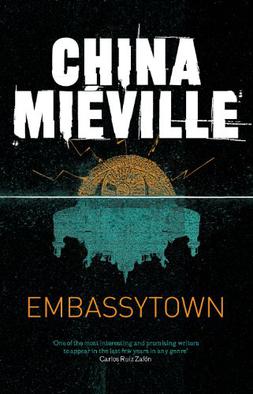I recently finished reading Embassytown by China Miéville, and while it had its rougher points in my opinion, it ended up a neat investigation of what language is and how it works, all in a sci-fi setting.
Plot:
The story takes place sometime in the future on a planet far away; specifically, a small colony on the planet Arieka. The natives of this world deal in inimitable biotechnology that's much sought after by all. However, they speak "Language"; a two-voiced language built on a sort of empathy that conveys the speakers meaning directly to the receiver. Ordinary humans can't communicate in Language—only special carefully synced pairs of clones called Ambassadors can manage it.
The central government sends out a new ambassador, a highly empathetic pair of men who are not clones. The arrival of this new Ambassador proves disastrous, and the inhabitants of Embassytown have to rally together to survive the fallout.
Tone:
Overall, there's a weight and a darkness to the story I really enjoyed. Dark sci-fi is great!
That said, my biggest beef with the book was the author's diction—that is, the timbre and level of his word choice. The main character, Avice, is more or less from the slums of Embassytown; she "escapes" as a sailor of sorts and explores other worlds (not shown), and yet her narration's vocabulary is beyond even that I'd expect of most graduate students. She frequently uses words like "plebiscite" and "vicissitudes" and so on, and it just doesn't fit. I'm hardly so classist as to insist that she couldn't learn such a vocabulary because of her background, but it's not clear how or when she could have! And even so, even if she could have developed this sort of vocabulary, the diction itself has an unnatural loftiness that was hard to shake.
But apparently, that's just how Miéville writes? So I've been told, at least. Eventually, I adjusted and got used to looking up weird words. Eventually, I could shrug it off with merely a roll of the eyes as yet another $10 word landed on the page. Oh well.
Themes:
The main themes involve the nature of language, a subject I always find exciting.
However, the novel seemed to flirt, at least toward the beginning, with the Sapir-Whorf hypothesis, which I generally dislike in its own right. I know it has its defenders, but personally, I consider it an intellectually bankrupt and largely disproven theory about how language affects us.
The book thankfully unpacked the nature of Language such that it only gently touched on that hypothesis, and furthermore it moved its focus elsewhere enough such that it diminished its reliance on it.
Verdict:
This is a highly intellectual book, so it's not for everyone. That said, despite its flaws, the novel pulled through and proved a fairly enjoyable read
 |
| from Wikipedia |
The story takes place sometime in the future on a planet far away; specifically, a small colony on the planet Arieka. The natives of this world deal in inimitable biotechnology that's much sought after by all. However, they speak "Language"; a two-voiced language built on a sort of empathy that conveys the speakers meaning directly to the receiver. Ordinary humans can't communicate in Language—only special carefully synced pairs of clones called Ambassadors can manage it.
The central government sends out a new ambassador, a highly empathetic pair of men who are not clones. The arrival of this new Ambassador proves disastrous, and the inhabitants of Embassytown have to rally together to survive the fallout.
Tone:
Overall, there's a weight and a darkness to the story I really enjoyed. Dark sci-fi is great!
That said, my biggest beef with the book was the author's diction—that is, the timbre and level of his word choice. The main character, Avice, is more or less from the slums of Embassytown; she "escapes" as a sailor of sorts and explores other worlds (not shown), and yet her narration's vocabulary is beyond even that I'd expect of most graduate students. She frequently uses words like "plebiscite" and "vicissitudes" and so on, and it just doesn't fit. I'm hardly so classist as to insist that she couldn't learn such a vocabulary because of her background, but it's not clear how or when she could have! And even so, even if she could have developed this sort of vocabulary, the diction itself has an unnatural loftiness that was hard to shake.
But apparently, that's just how Miéville writes? So I've been told, at least. Eventually, I adjusted and got used to looking up weird words. Eventually, I could shrug it off with merely a roll of the eyes as yet another $10 word landed on the page. Oh well.
Themes:
The main themes involve the nature of language, a subject I always find exciting.
However, the novel seemed to flirt, at least toward the beginning, with the Sapir-Whorf hypothesis, which I generally dislike in its own right. I know it has its defenders, but personally, I consider it an intellectually bankrupt and largely disproven theory about how language affects us.
The book thankfully unpacked the nature of Language such that it only gently touched on that hypothesis, and furthermore it moved its focus elsewhere enough such that it diminished its reliance on it.
Verdict:
This is a highly intellectual book, so it's not for everyone. That said, despite its flaws, the novel pulled through and proved a fairly enjoyable read